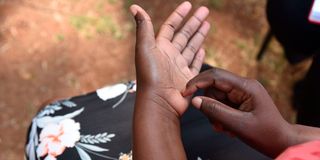Sterilisation of HIV+ women is rights violation

A woman who underwent tubal ligation without her consent shares her experience in Karen, Nairobi on February 7, 2023.
The road to realising the right to the highest attainable standard of health, including reproductive healthcare, for women living with HIV has been a harrowing one for many of them.
The African Gender and Media Initiative’s report “Robbed of Choice: Forced and Coerced Sterilisation Experiences of Women Living with HIV in Kenya” reveals an alarming trend of forced and coerced sterilisations of women, bullied into undergoing the procedures under the threat of losing vital medical and food assistance.
This gross violation of constitutional and fundamental rights not only undermines their dignity but also perpetuates a cycle of discrimination, stigma and violence. The right to health, dignity and reproductive health are not privileges to be granted or revoked at will; they are inherent constitutional rights that must be upheld and protected.
In 2014, the Kenya Legal and Ethical Issues Network on HIV and Aids (Kelin) filed two lawsuits on behalf of some of the women. The court ruled in favour of the women, declaring forced sterilisation a violation of their constitutional rights and awarding them Sh3 million each as compensation.
Legal victory
This landmark judgment is more than just a legal victory; it’s a historic stride towards upholding the dignity and rights of women living with HIV. The ruling recognised that their forced sterilisation is not just a health issue but a form of gender-based violence that results from multiple and intersecting forms of discrimination, including those based on gender, health status and socioeconomic status.
The effects of forced sterilisation extend far beyond the operating room, leaving indelible marks on the lives of the victims. The violation of the right to choose when to have a child strikes at the very core of a woman’s sense of self. Denied the autonomy to make informed decisions about their reproductive health, the women find themselves robbed of their completeness. This profound loss becomes a breeding ground for domestic violence as their partners may perceive them as incomplete.
Exacerbating this injustice is the intersectionality of discrimination the women face. Targeted for sterilisation due to their economic status, lower socioeconomic standing and HIV status, they are doubly marginalised. The ensuing vulnerability is a weapon wielded against those already grappling with the challenges of poverty and illness.
Reproductive health services
The court’s exoneration of the state but addressing official responsibility in facilitating such women’s access to reproductive health services is crucial, thus the need for sensitisation about court judgments affirming the right to choose when to have a child and disseminating court-backed scientific information.
Establishing support structures for the women’s access to quality reproductive health services and ensuring interventions for accurate information and informed choices are imperative.
Ms Kathia ([email protected]), a communications specialist, is a sexual and reproductive health and rights and youth advocate at Naya Kenya. Ms Njogu ([email protected]), a feminist lawyer, is the strategic litigation unit lead at the Kenya Legal and Ethical Issues Network on HIV and Aids (Kelin).






